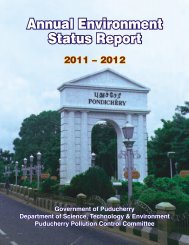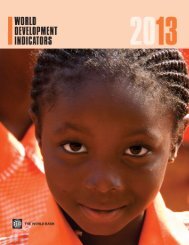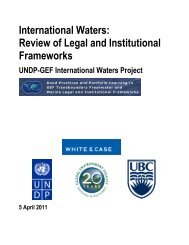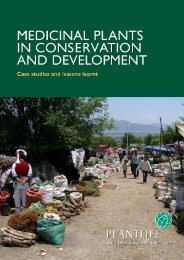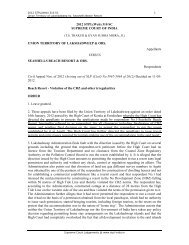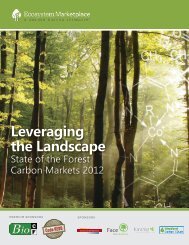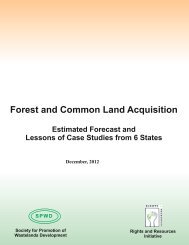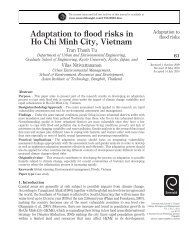DEFORESTATION AROUND THE WORLD - India Environment Portal
DEFORESTATION AROUND THE WORLD - India Environment Portal
DEFORESTATION AROUND THE WORLD - India Environment Portal
Create successful ePaper yourself
Turn your PDF publications into a flip-book with our unique Google optimized e-Paper software.
Preserving Biodiversity and Ecosystems: Catalyzing Conservation Contagion<br />
financially in those terms. However, major outlays of money and other resources for short<br />
time-periods have proven to be ineffective, inducing greed, waste, mismanagement and<br />
corruption. It may also highlight differences between the community base and corrupt<br />
western affluence (Gezon, 1997). More importantly, in order to work successfully with small<br />
rural communities, initiatives must cooperate at the lowest levels of community and<br />
regional organization, engaging personal, face-to face communication involving the<br />
thoughts, emotions, beliefs, attitudes and values of indigenous and other local stakeholders<br />
who are the voices of most decision-making, problem-solving and negotiations. The rural<br />
poor embody the same desires to assume responsibility for and to manage their own affairs<br />
as others, regardless of economic position. As a result, community involvement is an<br />
important ingredient for all conservation projects. Even when protecting large landscapes,<br />
community conservation projects can be effective at the regional scale by dividing initiatives<br />
into ground-level components for the retention of person-to-person interactions fostering<br />
trust and friendship. This process is exemplified by the case study of a community-based<br />
project in Assam, <strong>India</strong> (Horwich et al., 2010).<br />
2.3 Community conservation projects – below the “conservation radar”<br />
While ICDP enthusiasts have undergone some soul searching because of the backlash and<br />
criticism from biologists and sociologists, they have rightly begun to learn from ICDP<br />
failures (McShane & Wells, 2004). Unfortunately, small community conservation projects<br />
have been neglected and are “below the radar” of the mainstream conservation community<br />
(see Horwich & Lyon, 2007) not withstanding published accounts of successes as well as<br />
problems of such projects (Horwich, 1990a, 1998, 2005; Horwich & Lyon, 1988, 1995, 1998,<br />
1999; Horwich et al., 1993; Lyon & Horwich, 1996). Despite documented successes of<br />
community-based initiatives, funding for these projects has also been under the<br />
conservation radar, remaining at very low levels.<br />
Similarly, published articles have also ignored benefits to local communities from<br />
conservation of forests and their resources upon which indigenous and other local groups<br />
may depend (Shepard, 2004). Shepard (2004) notes “ conservation organizations themselves<br />
form their own international environment in which they talk to and argue with one another.<br />
Because they spend so much of their time in this company, there is too little exchange of<br />
ideas with those engaged in the forestry and poverty worlds.” She goes on to state that<br />
”ICDPs and the conservation bodies that manage them have been out of the mainstream of<br />
changing thought about forest management and rural livelihoods and now risk getting<br />
stuck with an old-fashioned paradigm. Though it will always be difficult to persuade people<br />
to abandon some of their old assumptions, it is now urgent that they consider doing so.”<br />
(Shepard, 2004).<br />
2.4 Community participation<br />
Level of participation - Communities are complex, heterogeneous groups of people with<br />
conflicting goals, aims, and desires. Complexities based on gender, politics, class, patronage,<br />
ethnicity, age, social standing and religion often have complex social histories that include<br />
exploitation, marginalization, and conflict (DuPuis & Vandergeest, 1996). For the last<br />
decade, the terms of community conservation, community participation, community-based<br />
conservation became buzz words as community conservation projects and ICDPs were in<br />
289



